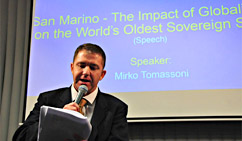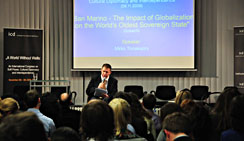"A World Without Walls":
An International Congress on "Soft Power", Cultural Diplomacy and Interdependence


Mirko Tomassoni
Former Captain Regent of San Marino
Mirko Tomassoni was Captain Regent – the Head of the State – of the Republic of San Marino (“Serenissima Repubblica di San Marino”) from the 1st October 2007 to the 1st April 2008, together with Alberto Selva, the other Captain Regent. Born in San Marino on the 24th of April, 1969, Mr. Tomassoni entered the Civil Police in 1992. In 1999, a car accident changed his life forever, restricting him to a wheelchair and altering his perspectives on the issues of disability.
Elected to the Local Town Council (“Giunta di Castello di Montegiardino”) for three terms, in June 2006 he successfully ran for a seat on the Grand and General Council—the unicameral Parliament of the State—as a member of the Party of the Socialists and Democrats. As Mirko Tomassoni became Captain Regent, he was the first-ever disabled Head of State of San Marino. As provided by the laws of San Marino, after being Head of State he returned to civilian life.
The participation of Mirko Tomassoni in “A World Without Walls” highlights the peculiar institutions of the Republic of San Marino, particularly the figure of the Head of State. The Republic of San Marino is possibly the most ancient republic of the world, being independent since the year 301. It is a presidential republic, but unlike many other States in the world, its institutions are unique, having remained unchanged since the 14th century.
The role of the Head of the State—or, more precisely, the Heads of State—is of particular importance. In fact, there are two Captain Regents who hold both functions of Head of State and Chief of Government. The two Captain Regents are elected by the Great and General Council on the 1st of April and the 1st of October every year; therefore, a Captain Regent remains in charge for only six months, and cannot be re-elected within a period of three years. The Captains Regents rule jointly and every decision must be made by consensus, as they have the right to veto each others’ decisions.
The Captain Regent has all the prerogatives of the Head of State: enacting the laws, representing the unity of the Country, acting as guardian and the defender of the Constitution, as well as the ability to dissolve the Great and General Council if this does not reach a stable majority. Moreover, he has all the functions of head of government, presiding over the Grand and General Council, leading and coordinating the State Congress (the government) and also presiding over many other assemblies (for example, Commission for Justice Affairs, Judiciary Council, Council of the “XII”). The history of this role dates back to antiquity; it is shaped on the role that the Consules had in the Roman Republic: a short duration, joint leadership, as well similar governmental functions.
Another facet which Mr. Tomassoni brings to “A World Without Walls” is not only his disability, but his advocacy for the rights of the disabled. When one thinks about walls – and knocking them down – the first thing coming to mind could be the Berlin Wall, particularly during this current year. Setting aside the former ideological divisions of the world, many other walls and barriers exist: physical barriers, for example, or mental barriers. Disability represents one of these barriers, and indeed it is probably one of the most difficult to break. The State of San Marino is one of the first countries to take an innovative and comprehensive approach in this field.
Disability is a problem a person must deal with daily, with considerable difficulties. It is a real wall that can seem to be insurmountable. Tomassoni, however, made his disability into a strength and focus of his political action, particularly once he became Captain Regent. More specifically, under his government the Republic of San Marino took many steps forward on the road to ensure equal opportunities for all citizens, regardless of their physical condition. This small state is one of the most ancient republics in the world: its capital city, lying on the steep slopes of Mount Titano, dates back to the Middle Ages. The republic, under Tomassoni’s leadership, took a very innovative and radical approach, when it decided to start eliminating all the architectural features which may deny access to public buildings to disabled people. It was a huge improvement, considering the particular geographical position of its capital – perched on the top of a steep hill. Indeed, San Marino was so committed to the rights of the disabled during this period that it contributed to the UN Convention on the Rights of Persons with Disabilities, becoming one of the first States to put it into practice in January 2008.
During Tomassoni’s leadership, many walls—in this case, architectural barriers—did indeed fall. Many public buildings were restored in order to make them accessible to the disabled; these concrete and visible signs were made possible due to a provision in the budget laws requiring a quota of the public finances to be used for policies to improve the lives of the disabled.
Moreover, in his activity of promoting policies against discrimination of disabled people, Tomassoni gave an interview to the main Italian broadcast channel, “Radio 1”. During this, he explained his views on disability, giving suggestions on how to improve the issue, noting that before anything else, it was necessary to inform the people, particularly government authorities: “It is not a problem of a lack of willingness; it is a matter of lack of knowledge about the issue”.
After his term was over, Tomassoni continued to be active in promoting equal opportunities for the disabled. He led the association “Attiva-mente”, which is committed to the rights of disabled people. “After the car accident I understood that indifference was the worst danger for me. I had to find a way to fight against it and to beat it. Time after time, I learned that the most effective way to do this was to act with enthusiasm: the fight against indifference can only be won through being ready to really live and act. Thus I founded this association, which realises simple, but effective events, always keeping a positive attitude”.
The ultimate aim of Mirko Tomassoni's commitment—not only as a politician but also as a simple citizen—is to “let the walls to fall down”, spreading the culture of non-discrimination, of tolerance and of respect. He wishes to give a concrete meaning to the notion of “equal opportunities”, which is still far from being realised, particularly regarding disability.




























































